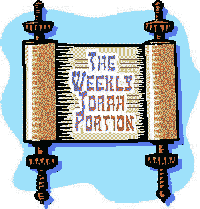Search our Archives:
» Home
» History
» Holidays
» Humor
» Places
» Thought
» Opinion & Society
» Writings
» Customs
» Misc.
|
Becoming Doers
By Michael Chessen
The Decalogue, the Ten Commandments, both encapsules and symbolizes
the giving of the entire Torah at Mt. Sinai. In the midst of all of the
drama surrounding this event, however, we tend to overlook its
preparations
and context.
The fact that the Torah is given to Moses and the Jewish people
during
the reading of Yitro is most instructive. Yitro, Moses' father-in law,
was
a convert of great insight, and his appearance in the Torah could
perhaps
be seen as foreshadowing the appearance of the renowned Rabbi Akiva, an
individual who also came to a recognition of the greatness of God at a
later stage of life but nevertheless made a considerable impression upon
Judaism as we know it.
Whereas we do not usually associate Yitro with the great prophets
and
scholars of our people, his contribution in our current reading is
indisputable. Upon witnessing the tremendous burden Moses bears as both
judge and teacher for all of the people of Israel, Yitro advises Moses
to
delegate authority. Before he delves into the specifics for this, Yitro
tells Moses that he first generally needs to inform the people of "the
way
in which they need to proceed and the deed they need to do." (Exodus
18:20)
This statement has begotten a number of homiletic stories in the
Talmud which all come to demonstrate a single principle. This being that
a
person only truly observes the Torah if he or she adheres not only to
the
letter of the law, but fully to its spirit as well.
Rabbi Shalom Gold sees this principle reflected in God's
instructions
in preparation for the giving of the Torah. Moses is told that only he
is
to ascend Mt. Sinai, and then God goes on to strenuously warn him
against
anyone as much as touching the base of the mountain. Being that it was
certainly within God's powers to keep the people off the mountain if He
so
desired, His apparent "anxiety" here appears somewhat puzzling.
However, God is less concerned with the people's actions than what
is
in their hearts. Jewish law, the halacha, should not be seen as merely a
"fence", but a way of life. Rabbi Gold points out that in Yitro's
exhortation to Moses, his usage of the term "to do", "ya'asoon", in
Hebrew
carries an extra letter nun, and should actually be translated as
"becoming
doers". Our choosing that which is good for both God and humanity should
not be dictated by either fear or the sake of appearance, but sincere
pursuit of truth and justice. And our conscientious adherence to this
principle will ultimately transform our very being.
Wishing you all a Shabbat Shalom !

|
|
Please let us know if you see something unsavory on the Google Ads and we will have them removed. Email us with the offensive URL (www.something.com)
|





|
